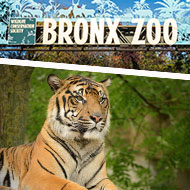
Big cats tested after developing a dry cough
A four-year-old female Malayan tiger from Bronx Zoo - a member of the Wildlife Conservation Society (WCS) - has tested positive for COVID-19 coronavirus.
The tiger, named Nadia, is thought to be the first known case of human-to-animal transmission in the United States.
Nadia is one of seven cats believed to have become infected by a zookeeper, who was asymptomatically infected with the virus. She, her sister Azul, two Amur tigers, and three African lions had developed a dry cough and all are expected to recover.
The positive COVID-19 test for the tiger was confirmed by USDA's National Veterinary Services Laboratory in Iowa.
A spokesperson for the Zoo said: "We tested the cat out of an abundance of caution and will ensure any knowledge we gain about COVID-19 will contribute to the world’s continuing understanding of this novel coronavirus.
“Though they have experienced some decrease in appetite, the cats at the Bronx Zoo are otherwise doing well under veterinary care and are bright, alert, and interactive with their keepers".
The Zoo said it is not known how the disease will develop in big cats since different species can react differently to novel infections. It said that it will continue to monitor the cats closely and anticipates full recoveries.
"Appropriate preventive measures are now in place for all staff who are caring for them, and the other cats in our four WCS zoos, to prevent further exposure of any other of our zoo cats," the spokesperson added.
The source of COVID-19 is believed to be a “wet market” in Wuhan, China, which sold both dead and wild animals. The World Health Organization has stressed there is no evidence to suggest that companion animals can get the disease or spread it to other people.



 The RCVS has announced a new version of its 1CPD mobile app, with enhanced features for veterinary surgeons and veterinary nurses to record their continuing professional development.
The RCVS has announced a new version of its 1CPD mobile app, with enhanced features for veterinary surgeons and veterinary nurses to record their continuing professional development.